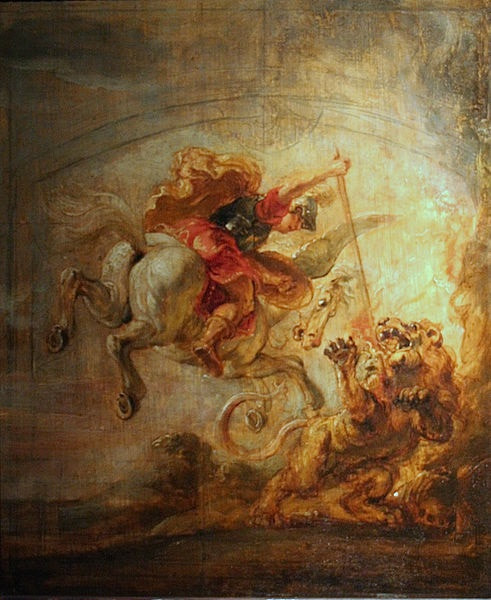THE CHIMERA IN GREEK MYTHOLOGY
The Chimera is one of the most famous, and fearsome, of monsters to appear in the tales of Greek mythology. A fire-breathing hybrid, the Chimera would prove to be a worthy opponent for the Greek hero Bellerophon.
Descriptions of the Chimera
The Chimera is a monster recorded in many works from antiquity, including Hesiod’s Theogony and Homer’s Iliad, amongst others.
Amongst the ancient sources there is a general agreement about the nature of the monster, for it was said to have had a body of a lion. From this body protruded two heads, one of a lion from which a stream of fire was breathed, and a second head from a she goat. Additionally, the head and body of a snake would act as a tail for the monster.
Amongst the ancient sources there is a general agreement about the nature of the monster, for it was said to have had a body of a lion. From this body protruded two heads, one of a lion from which a stream of fire was breathed, and a second head from a she goat. Additionally, the head and body of a snake would act as a tail for the monster.
The Chimera Family Line
|
The Chimera was said to have been the monstrous offspring of two of Greek mythology’s most famous monsters, Echidna and Typhon. Echidna was considered to be the mother of monsters, and the Chimera would have many famous siblings, including the Colchian Dragon, Orthus, the Lernaean Hydra and Cerberus.
It was also said that the Chimera was female, and according to Hesiod’s genealogy of the gods (the Theogony), the Chimera would mate with Orthus to bring forth two further monsters, the Nemean Lion and the Sphinx. |
|
The Chimera in Lycia
Most of the monsters of Greek mythology were intrinsically connected to a region of the ancient world, as was the case with the Hydra (Lernaea) and the Nemean Lion (Nemea). In the case of the Chimera, this monster was associated with the region of Lycia in Asia Minor.
The Chimera was perhaps raised to maturity by King Amisodarus, but then having become too dangerous, the monster was released into the Lycian countryside.
As was the want of Greek monsters, the Chimera would then terrorise the region, killing the unwary.
The Chimera was said to have also appeared away from Lycia, but her appearance elsewhere was said to be forewarning of an impending natural disaster.
The Chimera was perhaps raised to maturity by King Amisodarus, but then having become too dangerous, the monster was released into the Lycian countryside.
As was the want of Greek monsters, the Chimera would then terrorise the region, killing the unwary.
The Chimera was said to have also appeared away from Lycia, but her appearance elsewhere was said to be forewarning of an impending natural disaster.
Bellerophon and the ChimeraIt was in the time of King Iobates of Lycia that the Chimera was finally bested, for at that time, the Corinthian hero, Bellerophon, arrived in Asia Minor.
Previously, Bellerophon had been a guest of Iobates’ son-in-law, King Proetus, in Tiryns, but then Stheneboea, Proetus’ wife, falsely claimed that Bellerophon had attempted to rape her. Proetus believed his wife, but killing his guest, would have brought forth the Erinyes to punish him, and so Proetus decided that Iobates could aide him. Thus, it was that King Iobates set Bellerophon the seemingly impossible task of killing the Chimera. |
It was believed that no single man could accomplish such a task for the Chimera had bested small armies before. Bellerophon though was aided in his quest by the goddess Athena; and using the golden bridle of Athena, Bellerophon would harness the legendary winged horse, Pegasus.
Bellerophon now had no need to approach the Chimera on foot, and from the air, out of range of the monster’s fiery breath, the Greek hero would shoot arrow after arrow at the monster. The arrows of Bellerophon though, were unable to penetrate the hide of the Chimera.
Bellerophon would fly away briefly from the fight, but when he returned once more on the back of Pegasus, the hero had discarded his bow and arrows, and was this time armed with a lance.
Bellerophon though, did not mean to try and spear the Chimera, for the tip of the lance was covered with a block of lead. Bellerophon would swoop down upon the Chimera, and with a well-aimed thrust released the block of lead down the throat of the monster. The lead would melt, suffocating the Chimera.
Bellerophon now had no need to approach the Chimera on foot, and from the air, out of range of the monster’s fiery breath, the Greek hero would shoot arrow after arrow at the monster. The arrows of Bellerophon though, were unable to penetrate the hide of the Chimera.
Bellerophon would fly away briefly from the fight, but when he returned once more on the back of Pegasus, the hero had discarded his bow and arrows, and was this time armed with a lance.
Bellerophon though, did not mean to try and spear the Chimera, for the tip of the lance was covered with a block of lead. Bellerophon would swoop down upon the Chimera, and with a well-aimed thrust released the block of lead down the throat of the monster. The lead would melt, suffocating the Chimera.
|
|
Colin Quartermain - The Chimera - 30th November 2019
